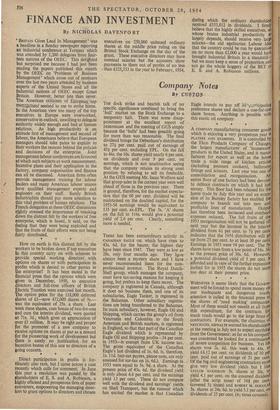FINANCE AND INVESTMENT
By NICHOLAS DAVENPORT ' BRITAIN Gives Lead In Management' was a headline in a Sunday newspaper reporting an industrial conference at Torquay which was attended by 1,200 delegates from four- teen nations of the OEEC. This delighted but surprised me because I had just been reading the papers published this month by the OEEC on 'Problems of Business Management' which arose out of seminars over the last two years attended by business experts of the United States and all the industrial nations of OEEC except Great lBretain. However, better late than never. The American criticism of Eaopean top mall2genieni seemed to me to strike home. In the American view too many of the top executives in Europe were overworked, conservative in outlook, unwilling to delegate authority widely enough and bad at human relations. As high productivity is an attitude first of management and second of labour, the Americans believe that European managers should take pains to explain to their workers the reasons behind the policies and decisions of the enterprise. Joint management-labour conferences are favoured at which such subjects as work measurement, Incentive plans and their application in the factory, company organisation and finance can all be discussed. American firms often provide management training for labour leaders and many American labour unions have qualified management experts and engineers on their staff. Surely British industrialists should pay more attention to this vital problem of human relations. The French delegation at these OEEC discussions rightly stressed the importance of breaking down the distrust felt by the workers of free enterprise, which is based, it said, on the feeling that they were being exploited and that the fruits of their efforts were not being fairly distributed.
How on earth is this distrust felt by the workers to be broken down if top executives In this country carry on with schemes to provide special working directors with options on shares or with participation in profits which is denied to other parties in the enterprise? It has been stated in the financial press that the options which were given in December, 1950, to executive directors and full-time officers of British Electric Traction were exercised last month. The option price for the 118,000 deferred shares of £1-now 472,000 shares of 5s.- Was the equivalent of 25s. a share. Last Week these shares, cum bonus of two-for-one and cum the interim dividend, were quoted at 71s. 3d., which gives an appreciation of ever £1 million. It may be right and proper for the promoter of a new company to receive options on shares at par as a reward for the pioneering work of development but there is surely no justification for an incentive bonus of this size to directors of a going concern.
• Direct participation in profits is for- hmately also rare, but I came across a case recently which calls for comment. In June this year a resolution was passed by the shareholders of E. S. and A. Robinson, a highly efficient and prosperous firm of paper Converters, empowering the managing direc- tors to grant options to directors and chosen
executives on 250,000 unissued ordinary shares at the middle price ruling on the Bristol Stock Exchange on the day of the grant. These executive directors may have nominal salaries but the accounts show payments to them out of profits of no less - than £325,333 in the year to February, 1954, during which the ordinary shareholdell received £553,812 in dividends. I fi believe that the highly skilled executives, 00 whose brains industrial productivity SO largely depends, should receive very lag" salaries-the old egalitarian Labour idea that the country could be run by executiveS on no more than £2,000 a year would have brought industrial Britain to a standstill-, but we must keep a sense of proportion an not go the whole hoggery of the BET of E. S. and A. Robinson millions.


































 Previous page
Previous page